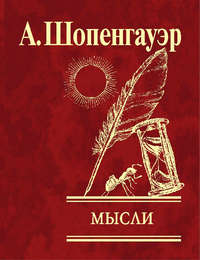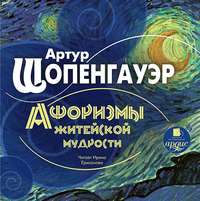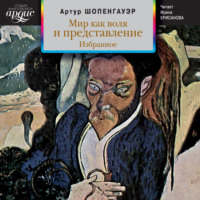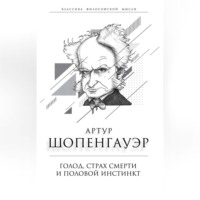 полная версия
полная версияThe World as Will and Idea (Vol. 2 of 3)
With the proof of the thing in itself it has happened to Kant precisely as with that of the a priori nature of the law of causality. Both doctrines are true, but their proof is false. They thus belong to the class of true conclusions from false premises. I have retained them both, but have proved them in an entirely different way, and with certainty.
The thing in itself I have neither introduced surreptitiously nor inferred according to laws which exclude it, because they really belong to its phenomenal appearance; nor, in general, have I arrived at it by roundabout ways. On the contrary, I have shown it directly, there where it lies immediately, in the will, which reveals itself to every one directly as the in-itself of his own phenomenal being.
And it is also this immediate knowledge of his own will out of which in human consciousness the conception of freedom springs; for certainly the will, as world-creating, as thing in itself, is free from the principle of sufficient reason, and therewith from all necessity, thus is completely independent, free, and indeed almighty. Yet, in truth, this only holds good of the will in itself, not of its manifestations, the individuals, who, just through the will itself, are unalterably determined as its manifestations in time. But in the ordinary consciousness, unenlightened by philosophy, the will is at once confused with its manifestation, and what belongs only to the former is attributed to the latter, whence arises the illusion of the unconditioned freedom of the individual. Therefore Spinoza says rightly that if the projected stone had consciousness, it would believe that it flew of its own free will. For certainly the in-itself of the stone also is the will, which alone is free; but, as in all its manifestations, here also, where it appears as a stone, it is already fully determined. But of all this enough has already been said in the text of this work.
Kant fails to understand and overlooks this immediate origin of the conception of freedom in every human consciousness, and therefore he now places (p. 533; V. 561) the source of that conception in a very subtle speculation, through which the unconditioned, to which the reason must always tend, leads us to hypostatise the conception of freedom, and it is only upon this transcendent Idea of freedom that the practical conception of it is supposed to be founded. In the “Critique of Practical Reason,” § 6, and p. 158 of the fourth and 235 of Rosenkranz's edition, he yet deduces this last conception differently by saying that the categorical imperative presupposes it. The speculative Idea is accordingly only the primary source of the conception of freedom for the sake of this presupposition, but here it obtains both significance and application. Neither, however, is the case. For the delusion of a perfect freedom of the individual in his particular actions is most lively in the conviction of the least cultivated man who has never reflected, and it is thus founded on no speculation, although often assumed by speculation from without. Thus only philosophers, and indeed only the most profound of them, are free from it, and also the most thoughtful and enlightened of the writers of the Church.
It follows, then, from all that has been said, that the true source of the conception of freedom is in no way essentially an inference, either from the speculative Idea of an unconditioned cause, nor from the fact that it is presupposed by the categorical imperative. But it springs directly from the consciousness in which each one recognises himself at once as the will, i. e., as that which, as the thing in itself, has not the principle of sufficient reason for its form, and which itself depends upon nothing, but on which everything else rather depends. Every one, however, does not recognise himself at once with the critical and reflective insight of philosophy as a determined manifestation of this will which has already entered time, as we might say, an act of will distinguished from that will to live itself; and, therefore, instead of recognising his whole existence as an act of his freedom, he rather seeks for freedom in his individual actions. Upon this point I refer the reader to my prize-essay on the freedom of the will.
Now if Kant, as he here pretends, and also apparently did in earlier cases, had merely inferred the thing in itself, and that with the great inconsistency of an inference absolutely forbidden by himself, what a remarkable accident would it then be that here, where for the first time he approaches the thing in itself more closely and explains it, he should recognise in it at once the will, the free will showing itself in the world only in temporal manifestations! I therefore really assume, though it cannot be proved, that whenever Kant spoke of the thing in itself, in the obscure depths of his mind he already always indistinctly thought of the will. This receives support from a passage in the preface to the second edition of the “Critique of Pure Reason,” pp. xxvii. and xxviii., in Rosenkranz's edition, p. 677 of the Supplement.
For the rest, it is just this predetermined solution of the sham third conflict that affords Kant the opportunity of expressing very beautifully the deepest thoughts of his whole philosophy. This is the case in the whole of the “Sixth Section of the Antinomy of Pure Reason;” but, above all, in the exposition of the opposition between the empirical and the intelligible character, p. 534-550; V. 562-578, which I number among the most admirable things that have ever been said by man. (As a supplemental explanation of this passage, compare a parallel passage in the Critique of Practical Reason, p. 169-179 of the fourth edition, or p. 224-231 of Rosenkranz's edition.) It is yet all the more to be regretted that this is here not in its right place, partly because it is not found in the way which the exposition states, and therefore could be otherwise deduced than it is, partly because it does not fulfil the end for which it is there – the solution of the sham antinomy. The intelligible character, the thing in itself, is inferred from the phenomenon by the inconsistent use of the category of causality beyond the sphere of all phenomena, which has already been sufficiently condemned. In this case the will of man (which Kant entitles reason, most improperly, and with an unpardonable breach of all use of language) is set up as the thing in itself, with an appeal to an unconditioned ought, the categorical imperative, which is postulated without more ado.
Now, instead of all this, the plain open procedure would have been to start directly from the will, and prove it to be the in-itself of our own phenomenal being, recognised without any mediation; and then to give that exposition of the empirical and the intelligible character to explain how all actions, although necessitated by motives, yet, both by their author and by the disinterested judge, are necessarily and absolutely ascribed to the former himself and alone, as depending solely upon him, to whom therefore guilt and merit are attributed in respect of them. This alone was the straight path to the knowledge of that which is not phenomenon, and therefore will not be found by the help of the laws of the phenomenon, but is that which reveals itself through the phenomenon, becomes knowable, objectifies itself – the will to live. It would then have had to be exhibited merely by analogy as the inner nature of every phenomenon. Then, however, it certainly could not have been said that in lifeless or even animal nature no faculty can be thought except as sensuously conditioned (p. 546; V. 574), which in Kant's language is simply saying that the explanation, according to the law of causality, exhausts the inner nature of these phenomena, and thus in their case, very inconsistently, the thing in itself disappears. Through the false position and the roundabout deduction according with it which the exposition of the thing in itself has received from Kant, the whole conception of it has also become falsified. For the will or the thing in itself, found through the investigation of an unconditioned cause, appears here related to the phenomenon as cause to effect. But this relation exists only within the phenomenal world, therefore presupposes it, and cannot connect the phenomenal world itself with what lies outside it, and is toto genere different from it.
Further, the intended end, the solution of the third antinomy by the decision that both sides, each in a different sense, are right, is not reached at all. For neither the thesis nor the antithesis have anything to do with the thing in itself, but entirely with the phenomenon, the objective world, the world as idea. This it is, and absolutely nothing else, of which the thesis tries to show, by means of the sophistry we have laid bare, that it contains unconditioned causes, and it is also this of which the antithesis rightly denies that it contains such causes. Therefore the whole exposition of the transcendental freedom of the will, so far as it is a thing in itself, which is given here in justification of the thesis, excellent as it is in itself, is yet here entirely a μεταβασις εις αλλο γενος. For the transcendental freedom of the will which is expounded is by no means the unconditioned causality of a cause, which the thesis asserts, because it is of the essence of a cause that it must be a phenomenon, and not something which lies beyond all phenomena and is toto genere different.
If what is spoken of is cause and effect, the relation of the will to the manifestation (or of the intelligible character to the empirical) must never be introduced, as happens here: for it is entirely different from causal relation. However, here also, in this solution of the antinomy, it is said with truth that the empirical character of man, like that of every other cause in nature, is unalterably determined, and therefore that his actions necessarily take place in accordance with the external influences; therefore also, in spite of all transcendental freedom (i. e., independence of the will in itself of the laws of the connection of its manifestation), no man has the power of himself to begin a series of actions, which, however, was asserted by the thesis. Thus also freedom has no causality; for only the will is free, and it lies outside nature or the phenomenon, which is just its objectification, but does not stand in a causal relation to it, for this relation is only found within the sphere of the phenomenon, thus presupposes it, and cannot embrace the phenomenon itself and connect it with what is expressly not a phenomenon. The world itself can only be explained through the will (for it is the will itself, so far as it manifests itself), and not through causality. But in the world causality is the sole principle of explanation, and everything happens simply according to the laws of nature. Thus the right lies entirely on the side of the antithesis, which sticks to the question in hand, and uses that principle of explanation which is valid with regard to it; therefore it needs no apology. The thesis, on the other hand, is supposed to be got out of the matter by an apology, which first passes over to something quite different from the question at issue, and then assumes a principle of explanation which is inapplicable to it.
The fourth conflict is, as has already been said, in its real meaning tautological with the third. In its solution Kant develops still more the untenable nature of the thesis; while for its truth, on the other hand, and its pretended consistency with the antithesis, he advances no reason, as conversely he is able to bring no reason against the antithesis. The assumption of the thesis he introduces quite apologetically, and yet calls it himself (p. 562; V. 590) an arbitrary presupposition, the object of which might well in itself be impossible, and shows merely an utterly impotent endeavour to find a corner for it somewhere where it will be safe from the prevailing might of the antithesis, only to avoid disclosing the emptiness of the whole of his once-loved assertion of the necessary antinomy in human reason.
Now follows the chapter on the transcendental ideal, which carries us back at once to the rigid Scholasticism of the Middle Ages. One imagines one is listening to Anselm of Canterbury himself. The ens realissimum, the essence of all realities, the content of all affirmative propositions, appears, and indeed claims to be a necessary thought of the reason. I for my part must confess that to my reason such a thought is impossible, and that I am not able to think anything definite in connection with the words which denote it.
Moreover, I do not doubt that Kant was compelled to write this extraordinary chapter, so unworthy of him, simply by his fondness for architectonic symmetry. The three principal objects of the Scholastic philosophy (which, as we have said, if understood in the wider sense, may be regarded as continuing down to Kant), the soul, the world, and God, are supposed to be deduced from the three possible major propositions of syllogisms, though it is plain that they have arisen, and can arise, simply and solely through the unconditioned application of the principle of sufficient reason. Now, after the soul had been forced into the categorical judgment, and the hypothetical was set apart for the world, there remained for the third Idea nothing but the disjunctive major. Fortunately there existed a previous work in this direction, the ens realissimum of the Scholastics, together with the ontological proof of the existence of God set up in a rudimentary form by Anselm of Canterbury and then perfected by Descartes. This was joyfully made use of by Kant, with some reminiscence also of an earlier Latin work of his youth. However, the sacrifice which Kant makes to his love of architectonic symmetry in this chapter is exceedingly great. In defiance of all truth, what one must regard as the grotesque idea of an essence of all possible realities is made an essential and necessary thought of the reason. For the deduction of this Kant makes use of the false assertion that our knowledge of particular things arises from a progressive limitation of general conceptions; thus also of a most general conception of all which contains all reality in itself. In this he stands just as much in contradiction with his own teaching as with the truth, for exactly the converse is the case. Our knowledge starts with the particular and is extended to the general, and all general conceptions arise by abstraction from real, particular things known by perception, and this can be carried on to the most general of all conceptions, which includes everything under it, but almost nothing in it. Thus Kant has here placed the procedure of our faculty of knowledge just upside down, and thus might well be accused of having given occasion to a philosophical charlatanism that has become famous in our day, which, instead of recognising that conceptions are thoughts abstracted from things, makes, on the contrary the conceptions first, and sees in things only concrete conceptions, thus bringing to market the world turned upside down as a philosophical buffoonery, which of course necessarily found great acceptance.
Even if we assume that every reason must, or at least can, attain to the conception of God, even without revelation, this clearly takes place only under the guidance of causality. This is so evident that it requires no proof. Therefore Chr. Wolf says (Cosmologia Generalis, prœf., p. 1): Sane in theologia naturali existentiam Numinis e principiis cosmologicis demonstramus. Contingentia universi et ordinis naturæ, una cum impossibilitate casus, sunt scala, per quam a mundo hoc adspectabili ad Deum ascenditur. And, before him, Leibnitz said, in connection with the law of causality: Sans ce grand principe on ne saurait venir à la preuve de l'existence de Dieu. On the other hand, the thought which is worked out in this chapter is so far from being essential and necessary to reason, that it is rather to be regarded as a veritable masterpiece of the monstrous productions of an age which, through strange circumstances, fell into the most singular aberrations and perversities, such as the age of the Scholastics was – an age which is unparalleled in the history of the world, and can never return again. This Scholasticism, as it advanced to its final form, certainly derived the principal proof of the existence of God from the conception of the ens realissimum, and only then used the other proofs as accessory. This, however, is mere methodology, and proves nothing as to the origin of theology in the human mind. Kant has here taken the procedure of Scholasticism for that of reason – a mistake which indeed he has made more than once. If it were true that according to the essential laws of reason the Idea of God proceeds from the disjunctive syllogism under the form of an Idea of the most real being, this Idea would also have existed in the philosophy of antiquity; but of the ens realissimum there is nowhere a trace in any of the ancient philosophers, although some of them certainly teach that there is a Creator of the world, yet only as the giver of form to the matter which exists without him, δεμιουργος, a being whom they yet infer simply and solely in accordance with the law of causality. It is true that Sextus Empiricus (adv. Math., ix. § 88) quotes an argument of Cleanthes, which some have held to be the ontological proof. This, however, it is not, but merely an inference from analogy; because experience teaches that upon earth one being is always better than another, and man, indeed, as the best, closes the series, but yet has many faults; therefore there must exist beings who are still better, and finally one being who is best of all (κρατιστον, αριστον), and this would be God.
On the detailed refutation of speculative theology which now follows I have only briefly to remark that it, and in general the whole criticism of the three so-called Ideas of reason, thus the whole Dialectic of Pure Reason, is indeed to a certain extent the goal and end of the whole work: yet this polemical part has not really an absolutely universal, permanent, and purely philosophical interest, such as is possessed by the preceding doctrinal part, i. e., the æsthetic and analytic; but rather a temporary and local interest, because it stands in a special relation to the leading points of the philosophy which prevailed in Europe up till the time of Kant, the complete overthrow of which was yet, to his immortal credit, achieved by him through this polemic. He has eliminated theism from philosophy; for in it, as a science and not a system of faith, only that can find a place which is either empirically given or established by valid proofs. Naturally we only mean here the real seriously understood philosophy which is concerned with the truth, and nothing else; and by no means the jest of philosophy taught in the universities, in which, after Kant as before him, speculative theology plays the principal part, and where, also, after as before him, the soul appears without ceremony as a familiar person. For it is the philosophy endowed with salaries and fees, and, indeed, also with titles of Hofrath, which, looking proudly down from its height, remains for forty years entirely unaware of the existence of little people like me, and would be thoroughly glad to be rid of the old Kant with his Critiques, that they might drink the health of Leibnitz with all their hearts. It is further to be remarked here, that as Kant was confessedly led to his doctrine of the a priori nature of the conception of causality by Hume's scepticism with regard to that conception, it may be that in the same way Kant's criticism of all speculative theology had its occasion in Hume's criticism of all popular theology, which he had given in his “Natural History of Religion,” a book so well worth reading, and in the “Dialogues on Natural Religion.” Indeed, it may be that Kant wished to a certain extent to supplement this. For the first-named work of Hume is really a critique of popular theology, the pitiable condition of which it seeks to show; while, on the other hand, it points to rational or speculative theology as the genuine, and that which is worthy of respect. But Kant now discloses the groundlessness of the latter, and leaves, on the other hand, popular theology untouched, nay, even establishes it in a nobler form as a faith based upon moral feeling. This was afterwards distorted by the philosophasters into rational apprehensions, consciousness of God, or intellectual intuitions of the supersensible, of the divine, &c., &c.; while Kant, as he demolished old and revered errors, and knew the danger of doing so, rather wished through the moral theology merely to substitute a few weak temporary supports, so that the ruin might not fall on him, but that he might have time to escape.
Now, as regards the performance of the task, no critique of reason was necessary for the refutation of the ontological proof of the existence of God; for without presupposing the æsthetic and analytic, it is quite easy to make clear that that ontological proof is nothing but a subtle playing with conceptions which is quite powerless to produce conviction. There is a chapter in the “Organon” of Aristotle which suffices as fully for the refutation of the ontological proof as if it had been written intentionally with that purpose. It is the seventh chapter of the second book of the “Analyt. Post.” Among other things, it is expressly said there: “το δε ειναι ουκ ουσια ουδενι,” i. e., existentia nunquam ad essentiam rei pertinet.
The refutation of the cosmological proof is an application to a given case of the doctrine of the Critique as expounded up to that point, and there is nothing to be said against it. The physico-theological proof is a mere amplification of the cosmological, which it presupposes, and it finds its full refutation only in the “Critique of Judgment.” I refer the reader in this connection to the rubric, “Comparative Anatomy,” in my work on the Will in Nature.
In the criticism of this proof Kant has only to do, as we have already said, with speculative theology, and limits himself to the School. If, on the contrary, he had had life and popular theology also in view, he would have been obliged to add a fourth proof to the three he has considered – that proof which is really the effective one with the great mass of men, and which in Kant's technical language might best be called the keraunological. It is the proof which is founded upon the needy, impotent, and dependent condition of man as opposed to natural forces, which are infinitely superior, inscrutable, and for the most part threatening evil; to which is added man's natural inclination to personify everything, and finally the hope of effecting something by prayers and flattery, and even by gifts. In every human undertaking there is something which is not in our power and does not come within our calculations; the wish to win this for oneself is the origin of the gods. “Primus in orbe Deos fecit timor” is an old and true saying of Petronius. It is principally this proof which is criticised by Hume, who throughout appears as Kant's forerunner in the writings referred to above. But those whom Kant has placed in a position of permanent embarrassment by his criticism of speculative theology are the professors of philosophy. Salaried by Christian governments, they dare not give up the chief article of faith.9 Now, how do these gentlemen help themselves? They simply declare that the existence of God is self-evident. Indeed! After the ancient world, at the expense of its conscience, had worked miracles to prove it, and the modern world, at the expense of its understanding, had brought into the field ontological, cosmological, and physico-theological proofs – to these gentlemen it is self-evident. And from this self-evident God they then explain the world: that is their philosophy.
Till Kant came there was a real dilemma between materialism and theism, i. e., between the assumption that a blind chance, or that an intelligence working from without in accordance with purposes and conceptions, had brought about the world, neque dabatur tertium. Therefore atheism and materialism were the same; hence the doubt whether there really could be an atheist, i. e., a man who really could attribute to blind chance the disposition of nature, so full of design, especially organised nature. See, for example, Bacon's Essays (sermones fideles), Essay 16, on Atheism. In the opinion of the great mass of men, and of the English, who in such things belong entirely to the great mass (the mob), this is still the case, even with their most celebrated men of learning. One has only to look at Owen's “Ostéologie Comparée,” of 1855, preface, p. 11, 12, where he stands always before the old dilemma between Democritus and Epicurus on the one side, and an intelligence on the other, in which la connaissance d'un être tel que l'homme a existé avant que l'homme fit son apparition. All design must have proceeded from an intelligence; he has never even dreamt of doubting this. Yet in the lecture based upon this now modified preface, delivered in the Académie des Sciences on the 5th September 1853, he says, with childish naivete: “La téléologie, ou la théologie scientifique” (Comptes Rendus, Sept. 1853), that is for him precisely the same thing! Is anything in nature designed? then it is a work of intention, of reflection, of intelligence. Yet, certainly, what has such an Englishman and the Académie des Sciences to do with the “Critique of Judgment,” or, indeed, with my book upon the Will in Nature? These gentlemen do not see so far below them. These illustres confrères disdain metaphysics and the philosophie allemande: they confine themselves to the old woman's philosophy. The validity of that disjunctive major, that dilemma between materialism and theism, rests, however, upon the assumption that the present given world is the world of things in themselves; that consequently there is no other order of things than the empirical. But after the world and its order had through Kant become mere phenomenon, the laws of which rest principally upon the forms of our intellect, the existence and nature of things and of the world no longer required to be explained according to the analogy of the changes perceived or effected by us in the world; nor must that which we comprehend as means and end have necessarily arisen as the consequence of a similar knowledge. Thus, inasmuch as Kant, through his important distinction between phenomenon and thing in itself, withdrew the foundation from theism, he opened, on the other hand, the way to entirely different and more profound explanations of existence.









